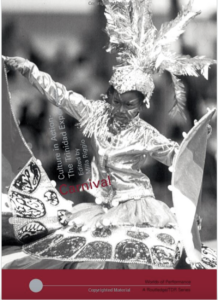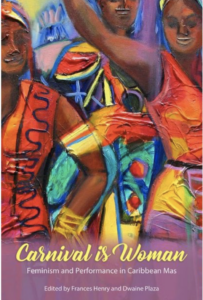Scholarly Conversation around Carnival
This section shows readers the importance of the work done by scholars in this field, building a foundation of Afro Caribbean culture, rebellion,resistance, and performance for this exhibit.
One of the ways this section does this is through its focus on how Afro-Caribbean people used Carnival and performance as an act of opposition
Many of these sources have been widely used by Caribbean scholars to piece together a history of Afro-Caribbean culture, spirituality, performance, festivities, memory, and rebellion in the eighteenth and nineteenth centuries. Scholars have used these texts to look at how Afro-Caribbean people used Carnival and performance as a form of resistance to enslavement as well as emphasized the significance of oral tradition. For example, in Mrs. Carmichael’s journal, she emphasizes how these West Indian people said enslavers did not want them to dance. Dancing was a huge part of their oral tradition and colonial powers were reluctant to “allow this” because of the fear dancing brought about. Colonizers also were not able to understand the significance dancing carried, and how dancing was used as a means of maintaining one’s culture. As mentioned in “Women and the De-Africanization of Trinidad Carnival: From the Jamette to Bikinis, Beads, and Feathers” in Carnival is Woman, Feminism, and Performance in Caribbean Mas, “African slaves never forgot about where they came from and passed along their memories to each subsequent generation through oral history and reminiscences” (Plaza & DeCosmo 2004, 39). Themes of rebellion, performance, and memory are also important in the larger history of Afro-Caribbean festivities.

Caption: Carnival is Women and Performance in Caribbean Mass (left) and Carnival: Culture in Action-The Trinidad Experience (right)
Citations: Henry, Frances. Carnival Is Woman: Feminism and Performance in Caribbean Mas. University Press of Mississippi, 2020.
Riggio, Milla Cozart. Carnival: Culture in Action: the Trinidad Experience. London: Routledge, 2004.

Work by scholars Hollis Liverpool (“Origins of Rituals and Customs in the Trinidad Carnival: African or European?”), J.D Elder (“Cannes Brulees”), Erroll Hill (“Traditional Figures In Carnival: Their Preservation, Development, And Interpretation”), Milla C. Riggio (“Resistance and Identity: Carnival in Trinidad and Tobago” and Carnival: Culture in Action - the Trinidad Experience), Frances Henry and Dwaine Plaza (Carnival is Woman, Feminism, and Performance in Caribbean Mas), Kevin Adonis Brown (Carnival is High Mass: Carnival and the Poetics of Caribbean Carnival) and many others have been critical and influential in making this exhibit.
Works Cited:
Carmichael, Mrs. (A. C.). Domestic Manners And Social Condition of the White, Coloured, And Negro
Population of the West Indies. 2d ed. London: Whittaker, 1834.
Plaza, Dwaine; DeCosmo, Jan. “Women and the De-Africanization of Trinidad Carnival: From the
Jamette to Bikini, Beads, and Feathers.” Carnival Is Woman: Feminism and Performance in
Caribbean Mas, edited by Henry, Frances, 21-39, University Press of Mississippi, 2020
Images:
Henry, Frances. Carnival Is Woman: Feminism and Performance in Caribbean Mas. University Press of
Mississippi, 2020.
Riggio, Milla Cozart. Carnival: Culture in Action: the Trinidad Experience. London: Routledge, 2004.
Further Readings:
Henry, Frances. Carnival Is Woman: Feminism and Performance in Caribbean Mas. University Press of
Mississippi, 2020.
Riggio, Milla Cozart. Carnival: Culture in Action: the Trinidad Experience. London: Routledge, 2004.
